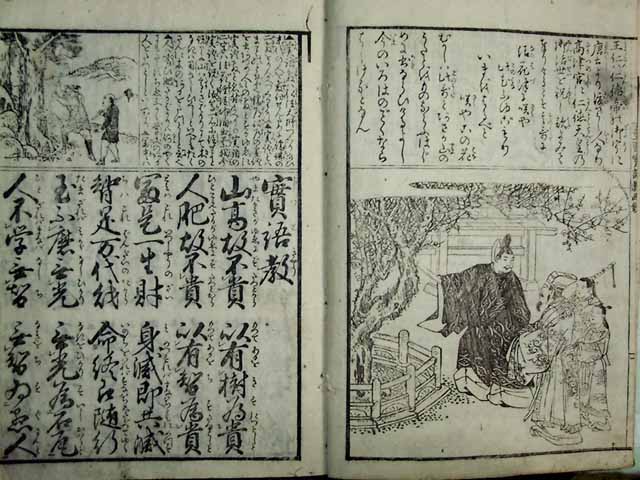Jitsugo Kyo (Literal translation “Real Language Teaching”) (実語教)
Commentary on the “Jitsugo Kyō”
The Jitsugo Kyō was established in the Heian period (794-1192) and became popular during the Kamakura period (1192-1333). Because of its strong Confucian flavor and its easy-to-remember couplet structure, it became very popular as reading material at Terakoya (temple school) during the Edo period (1603-1868).
The author is said to be Kobo Daishi, but there is no proof.
A quotation from the Jitsugo Kyo is also found in Fukuzawa Yukichi’s “Gakumon no Susume” (Recommendations for Learning), and referring to the first sentence “Mountains are not precious because they are high, but because trees grow on them”,.a willow poem, “Fuji no mieno ni mo tsukurushi-shi Jistugokyo (A man who has not seen Mt. Fuji made a real language teaching),” was also composed, Jitsugo-kyo seems very popular,
The book pictured below is the “Bunsei Shinban Jitsugo Kyo Esho” published in Kyoto in Bunsei 3. It is relatively easy to read, with illustrations and commentary. The second half of the book includes the Dojikyo. (Most JitsugoKyo books are published in a form that includes the Dojikyo.)
「実語教」解説
実語教は平安時代に成立し、鎌倉時代に普及した書物です。儒教色が強く、また対句構成で暗記がしやすかったため江戸時代の寺子屋の素読用教材として非常に普及しました。
作者は弘法大師とされていますが確証はありません。
福沢諭吉の「学問のススメ」にも実語教からの引用が見られたり、出だしの”山高きゆえに貴からず 木あるをもって貴しとす”の一文を捉えて”富士を見ぬ 奴がつくりし 実語教”という川柳が作られたりした面をみてもかなり普及していたようです。
下の写真の本は文政三年に京都で発行された「文政新版実語教絵鈔」です。絵入りで解説も付記され比較的読みやすく構成されています。後半には「童子教」も掲載されています。(ほとんどの実語教の書物は童子教を含めた形で出版されています)
Jitsugo Kyo
実語教
Mountains are not precious because they are high, but because trees grow on them
山高故不貴 以有樹為貴
(山高きが故に貴からず。木有るを以て貴しとす。)
A man is not noble because he has good physique, but because he possesses wisdom.
人肥故不貴 以有智為貴
(人肥えたるが故に貴からず。智有るを以て貴しとす。)
Wealth is a life-long treasure; when the body is destroyed, it is destroyed together.
富是一生財 身滅即共滅
(富は是一生の財。身滅すれば即ち共に滅す。)
Wisdom is the wealth of all generations. When life ends, wisdom goes with it.
智是万代財 命終即随行
(智は是万代の財。命終われば即ち随って行く。)
If a jewel is not polished, it has no light. If it has no light is a stone tile.
玉不磨無光 無光為石瓦
(玉磨かざれば光無し。光無きを石瓦とす。)
If a person does not learn, he does not have wisdom, and if he does not have wisdom, he is a fool.
人不学無智 無智為愚人
(人学ばざれば智無し。智無きを愚人とす。)
The wealth in one’s warehouse will decay, but the wealth in one’s body will never decay.
倉内財有朽 身内財無朽
(倉の内の財は朽つること有り。身の内の財は朽ちること無し。)
Even if you accumulate a thousand riches, it is no more than a day’s study.
雖積千両金 不如一日学
(千両の金を積むと雖も。一日の学に如かず。)
Brothers do not always meet, but they are brothers for the sake of compassion.
兄弟常不合 慈悲為兄弟
(兄弟常に会わず。慈悲を兄弟とす。)
Goods do not endure forever; wisdom is one’s treasure.
財物永不存 才智為財物
(財物永く存せず。才智を財物とす。)
The four great things decline from day to day, and the mind is dark at night.
四大日々衰 心神夜々暗
(四大日々衰え、心神夜々に暗し。)
If you do not work and learn when you are young, and you will regret it in your old age,
and yet there is no profit to be taken from it. Therefore, do not be weary of reading books.
幼時不勤学 老後雖恨悔
尚無有取益 故讀書勿倦
(幼きときに勤め学ばざれば、老いて後恨み悔ゆと雖も、
なお取益有るを無し。かかるが故に書を読んで倦むをなかれ。)
Do not neglect your studies. Do not sleep, and be merry in the wake.
学文勿怠時 除眠通夜涌
(学文怠る時なかれ。眠りを除きて通夜に涌せよ。)
Learn all day long with patience and hunger. If you have the teacher but do not study,
you will be like a city person. If you learn and read, but do not review, ,
it is like counting your neighbor’s possessions. A man of virtue loves a wise man.
忍飢終日習 雖會師不学
徒如向市人 雖習讀不復
只如計隣財 君子愛智者
(飢えを忍びて終日習え。師に會すと雖も学せざれば)
(徒に市人に向かうが如し。習い読むと雖も復せざれば)
(只隣の財を数えるが如し。君子は智者を愛す。)
The little people love the rich. Even if he enter a wealthy family,
he is still like a flower under the frost for those who have no wealth.
小人愛福人 雖入富貴家
為無財人者 猶如霜下花
(小人は福人を愛す。富貴の家に入ると雖も、)
(財無き人の為は、なお霜の下の花の如し。)
Even though you come from a poor and lowly family, if you are a wise person
you are like a lotus in the mud. Parents are like heaven and earth.
雖出貧賤門 為有智人者
宛如泥中蓮 父母如天地
(貧賤の門を出ずると雖も、智有る人の為には、)
(あたかも泥中の蓮の如し。父母は天地の如し。 )
One’s master is like the sun and the moon, and their kin are like reeds
師君如日月 親族譬如葦
(師君は日月の如し。親族譬ば葦の如し。)
husband and wife should still be like tiles, and filial piety should be paid to parents morning and evening.
夫妻猶如瓦 父母孝朝夕
(夫妻は猶瓦の如く。父母には朝夕に孝せよ。)
Serve your master day and night. Do not quarrel with friends.
師君仕昼夜 交友勿諍事
(師君には昼夜に仕えよ。友に交わって諍う事なかれ。)
You should be more respectful to your elder brother, and more affectionate to your younger brother.
己兄尽禮敬 己弟致愛戯
(己より兄には礼敬を尽くせ。己より弟には愛戯を致せ。)
If a man has no wisdom, he is no better than a stone.
人而無智者 不異称木石
(人として智無きは、木石に異ならず。)
If a man has no filial piety, he is no better than a brute.
人而無孝者 不異称畜生
(人として孝無きは、畜生に異ならず。)
Without the three habits of learning the right ones, one cannot climb the seven steps to develop the mind.
不交三学友 何遊七学林
(三学の友に交わらずんば、何ぞ七学の林に遊ばん。)
If you do not get on a fourth-class boat, then who will cross the sea of eight pains?
不乗四等船 誰渡八苦海
(四等の船に乗らずんば、誰か八苦の海を渡さん。)
The eight righteous paths are wide, but the one who have ten eviless will not be able to follow it.
八正道雖廣 十悪人不往
(八正の道は廣しと雖も、十悪の人は往かず。)
A city of idleness is a truly pleasant place, but those who are dissolute and create mischief cannot go there to play.
無為都雖楽 報逸輩不遊
(無為の都に楽しむと雖も、報逸の輩は遊ばず。)
Respect the aged as you would your parents, and love the young as you would your children.
敬老如父母 愛幼如子弟
(老いたるを敬うは父母の如し、幼きを愛するは子弟の如し。)
If I respect others, they will respect me.
我敬他人者 他人亦敬我
(我他人を敬へば、他人亦我を敬う。)
If you respect the parents of others, they will also respect your parents.
己敬人親者 人亦敬己親
(己人の親を敬えば、人亦己が親を敬う。)
If you wish to attain success in your own life, you must first attain success in the life of others.
欲達己身者 先令達他人
(己が身をば達っせんと欲せば、先ず他人の身を達っせしめよ。)
When you see others’ sorrow, you must suffer together.
見他人之愁 即自共可患
(他人の愁いを見ては、即ち自ら共に患うべし。)
When you hear the joy of others, you should rejoice with them.
聞他人之嘉 即自共可悦
(他人のよろこびを聞いては、即ち自ら共に悦ぶべし。)
When you see good, go there quickly; when you see evil, avoid it immediately.
見善者速行 見悪者忽避
(善を見ては速やかに行け、悪を見ては忽ち避れ。)
He who loves evil will bring misfortune. For example, as if one responds to the sound of an echo.
好悪者招禍 譬如響応音
(悪を好む者は禍を招く。譬ば響きの音に応ずるが如し。)
He who practices righteousness will be blessed, just as if his shadow follows his body.
修善者蒙福 宛如随身影
(善を修する者は福を蒙る。あたかも身に影の随うが如し。)
Do not forget poverty even though you are wealthy. Or you may be rich at the beginning and poor at the end.
雖富勿忘貧 或始富終貧
(富むと雖も貧しきを忘るることなかれ。或いは始めに富み終わりに貧しいとも。)
Do not forget to be lowly even though you are noble. Or be rich in the beginning and poor at the end.
雖貴勿忘賎 或先貴後賎
(貴しと雖も賎しきを忘るることなかれ。或いは先に貴く終わりに賎しくとも。)
The most difficult to learn and easy to forget is the artistic accomplishments.
夫難習易忘 音聲之浮才
(それ習い難く忘れ易しは、音声の浮才。)
Also, easy to learn and hard to forget is the art of writing.
又易学難忘 書筆之博藝
(また学び易く忘れ難しは、書筆の博藝。)
Only with food can we nourish ourselves, and only with life can we have a body.
但有食有法 又有身有命
(但し食有れば法有り、また身あれば命有り。)
If you do not forget agriculture, do not abandon learning.
猶不忘農業 必莫廢学文
(なお農業を忘れざれば、必ず学文廃することなかれ。)
Therefore, scholars of later generations must first contemplate this book (jitsu-go-kyo)
故末代学者 先可按此書
(故に末代の学者、先ず此の書を按ずべし。)
This should be the beginning of your studies, and you should not forget it until the end of your life.
是学文之始 身終勿忘失
(是学文の始まり、身終つるまで忘失することなかれ。)

ディスカッション
コメント一覧
まだ、コメントがありません